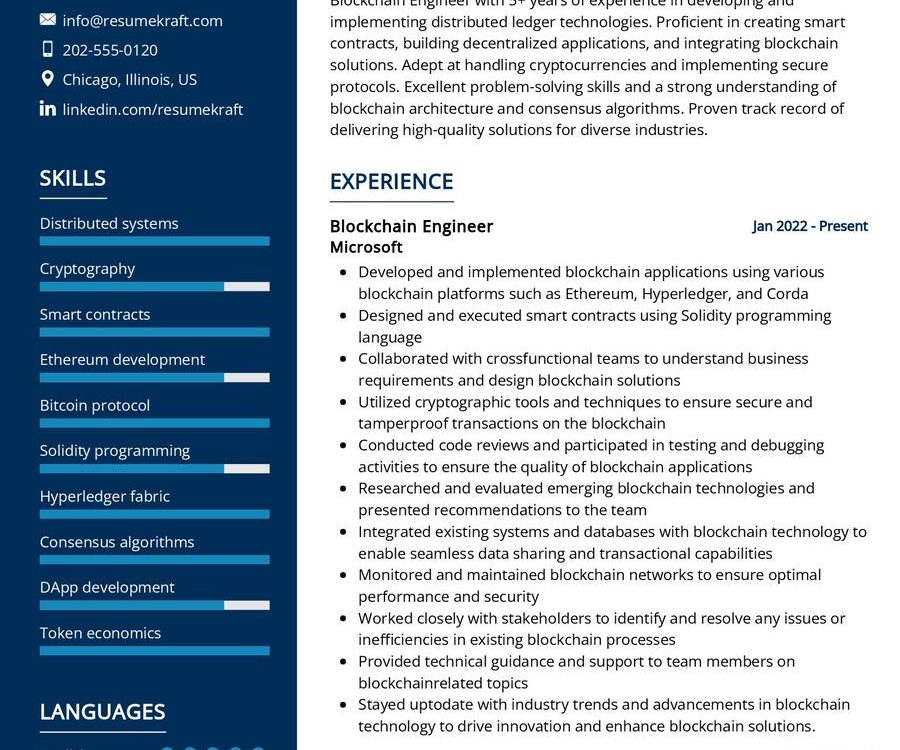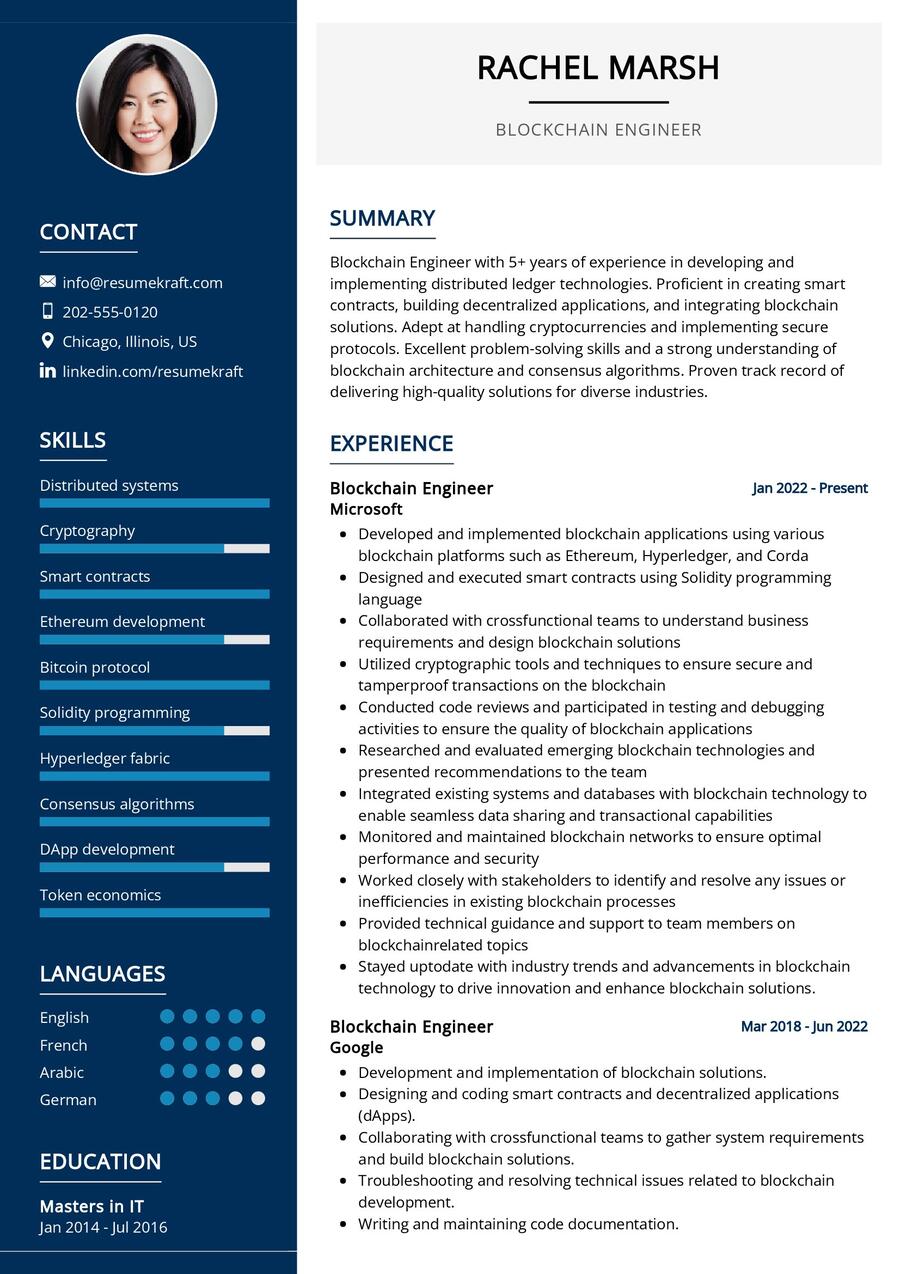Unlocking Success: The Role of a Blockchain Engineer
As the digital landscape continues to revolutionize industries, the demand for skilled professionals in cutting-edge technologies is on the rise. Among these roles, the position of a Blockchain Engineer has emerged as a key player in shaping the future of decentralized systems. In this exploration, we’ll delve into the multifaceted role of a Blockchain Engineer, a role that demands both technical prowess and innovative thinking.
What Does a Blockchain Engineer Do?
A Blockchain Engineer is at the forefront of developing and implementing blockchain solutions, playing a pivotal role in ensuring the security, efficiency, and transparency of decentralized systems. This role requires a deep understanding of blockchain technologies, cryptographic principles, and the ability to translate complex concepts into practical applications.
As a Blockchain Engineer, you’ll find yourself:
- Designing and implementing blockchain protocols tailored to specific use cases.
- Developing smart contracts to automate processes within blockchain networks.
- Ensuring the security and integrity of blockchain systems through cryptography.
- Collaborating with cross-functional teams to integrate blockchain solutions into existing infrastructures.
- Staying abreast of the latest developments in blockchain technology and advocating for best practices.
The role of a Blockchain Engineer is dynamic, requiring a continuous evolution of skills to navigate the ever-changing landscape of blockchain innovation.
Key Skills and Qualifications for a Blockchain Engineer
Becoming a proficient Blockchain Engineer involves a combination of education, technical skills, and a mindset geared towards problem-solving. Let’s break down the key requirements for those aspiring to thrive in this role:
- A Bachelor’s or Master’s degree in Computer Science, Information Technology, or a related field, providing a solid foundation in the technical domain.
- Expertise in blockchain platforms such as Ethereum, Hyperledger, or Corda, showcasing practical experience in developing blockchain solutions.
- Proficiency in programming languages like Solidity, C++, or Java, essential for smart contract development and blockchain application programming.
- Understanding of cryptographic principles, ensuring the secure implementation of blockchain protocols.
- Strong problem-solving skills, with the ability to address challenges unique to decentralized systems.
- Experience in collaborating with diverse teams to integrate blockchain solutions into real-world applications.
Continued learning and staying updated with the latest advancements in blockchain technology are crucial for success in this rapidly evolving field.
Responsibilities of a Blockchain Engineer
The responsibilities of a Blockchain Engineer span a wide spectrum, encompassing technical development, project management, and collaboration with stakeholders. Let’s explore the core responsibilities that define this role:
- Developing and implementing blockchain solutions that align with organizational objectives.
- Creating and deploying smart contracts to automate business processes on blockchain networks.
- Ensuring the security and integrity of blockchain systems through rigorous testing and cryptographic measures.
- Collaborating with cross-functional teams to integrate blockchain technology into existing systems.
- Providing expertise on blockchain best practices, guiding the team towards efficient and secure implementations.
- Staying informed about regulatory changes and industry trends related to blockchain technology.
Each responsibility carries its own set of challenges and learning opportunities, contributing to the holistic growth of a Blockchain Engineer.
Crafting an Impactful Resume as a Blockchain Engineer
Your resume serves as a gateway to showcasing your skills and experiences as a Blockchain Engineer. Here are some tips to create a resume that stands out:
- Highlight your practical experience in developing blockchain solutions, emphasizing specific projects and their impact.
- Showcase your proficiency in relevant programming languages, detailing your contributions to smart contract development.
- Quantify your achievements where possible, demonstrating the tangible results of your work in terms of efficiency, security, or process automation.
- List any relevant certifications or courses undertaken to demonstrate your commitment to continuous learning in blockchain technology.
- Customize your resume for each application, aligning your skills and experiences with the specific requirements of the job.
Remember, your resume is your professional narrative, painting a picture of your journey as a Blockchain Engineer.
Blockchain Engineer Resume Summary Examples
Your resume summary is the first impression you make on potential employers. Craft a compelling summary that encapsulates your unique strengths as a Blockchain Engineer:
- “Results-driven Blockchain Engineer with a proven track record in developing secure and efficient blockchain solutions. Proficient in Ethereum smart contract development and passionate about staying at the forefront of blockchain innovation.”
- “Innovative Blockchain Engineer with expertise in Hyperledger Fabric and a history of successful integration of blockchain technology into diverse business environments. Committed to continuous learning and adapting to the evolving landscape of decentralized systems.”
- “Experienced Blockchain Engineer skilled in creating and deploying smart contracts, with a focus on ensuring the integrity and security of blockchain networks. A collaborative team player dedicated to driving innovation in the blockchain space.”
Your resume summary sets the tone for your entire application, so make it impactful and aligned with the specific job you’re applying for.
Building Your Experience Section as a Blockchain Engineer
Your experience section is the heart of your resume, where you narrate the story of your career journey as a Blockchain Engineer. Consider these examples to effectively showcase your experiences:
- “Led the development of a decentralized supply chain solution using Ethereum, resulting in a 30% improvement in transparency and a 20% reduction in operational costs.”
- “Contributed to the integration of Hyperledger Fabric into an enterprise-level healthcare system, enhancing data security and streamlining transactions.”
- “Managed a team of developers in implementing a blockchain-based voting system, ensuring the integrity and transparency of the electoral process.”
Each experience should highlight not only your technical skills but also the real-world impact of your contributions as a Blockchain Engineer.
Education Section for Your Blockchain Engineer Resume
Your educational background is a crucial aspect of your journey as a Blockchain Engineer. Showcase your academic achievements and relevant certifications:
- Master of Science in Computer Science, XYZ University, 2018.
- Bachelor of Technology in Information Technology, ABC University, 2014.
- Certified Blockchain Developer, Blockchain Council, 2019.
Your educational milestones serve as a testament to your foundation of knowledge in the field of blockchain technology.
Skills Essential for a Blockchain Engineer
As a Blockchain Engineer, your skill set is your toolkit, equipped with the tools necessary to navigate the challenges of decentralized systems. Let’s categorize these into soft skills and hard skills:
Soft Skills:
- Problem-solving and critical thinking, essential for addressing complex challenges in blockchain development.
- Effective communication and collaboration, vital for working with diverse teams and stakeholders.
- Adaptability and continuous learning, crucial in a field that evolves rapidly.
- Attention to detail, ensuring the accuracy and security of blockchain implementations.
- Team leadership and management, valuable for overseeing blockchain projects from conception to completion.
Hard Skills:
- Proficiency in programming languages: Solidity, C++, Java.
- Expertise in blockchain platforms: Ethereum, Hyperledger, Corda.
- Smart contract development and deployment.
- Understanding of cryptographic principles and techniques.
- Integration of blockchain solutions into existing systems.
Each skill in your toolkit contributes to your ability to excel as a Blockchain Engineer, ensuring success in the dynamic world of decentralized technologies.
Common Mistakes to Avoid in Your Blockchain Engineer Resume
As you craft your resume, steer clear of common pitfalls that could hinder your chances of landing your dream job as a Blockchain Engineer:
- Avoid generic language; tailor your resume for each application to showcase your fit for the specific role.
- Highlight achievements, not just responsibilities, to provide depth to your professional narrative.
- Don’t underestimate the importance of a cover letter; use it as an opportunity to connect personally with potential employers.
- Avoid excessive technical jargon; ensure your resume is accessible to both technical and non-technical readers.
- Proofread meticulously to maintain a professional image and avoid errors that could undermine your credibility.
Each mistake represents a potential stumbling block; navigate carefully to present a resume that is both authentic and compelling.
Key Takeaways for Your Blockchain Engineer Resume
As we conclude this comprehensive guide to crafting a standout Blockchain Engineer resume, remember these key takeaways:
- Highlight your practical experience and achievements in developing blockchain solutions.
- Showcase your proficiency in relevant programming languages and blockchain platforms.
- Quantify your impact where possible, providing tangible evidence of your contributions.
- Include a section on continuous learning, emphasizing certifications and courses relevant to blockchain technology.
Armed with these insights and tips, you are well-equipped to create a resume that authentically reflects your journey, skills, and aspirations as a Blockchain Engineer. Best of luck in your job search!
Finally, feel free to utilize resources like AI Resume Builder, Resume Design, Resume Samples, Resume Examples, Resume Skills, Resume Help, Resume Synonyms, and Job Responsibilities to create a standout application and prepare for the Blockchain Engineer job interview.


